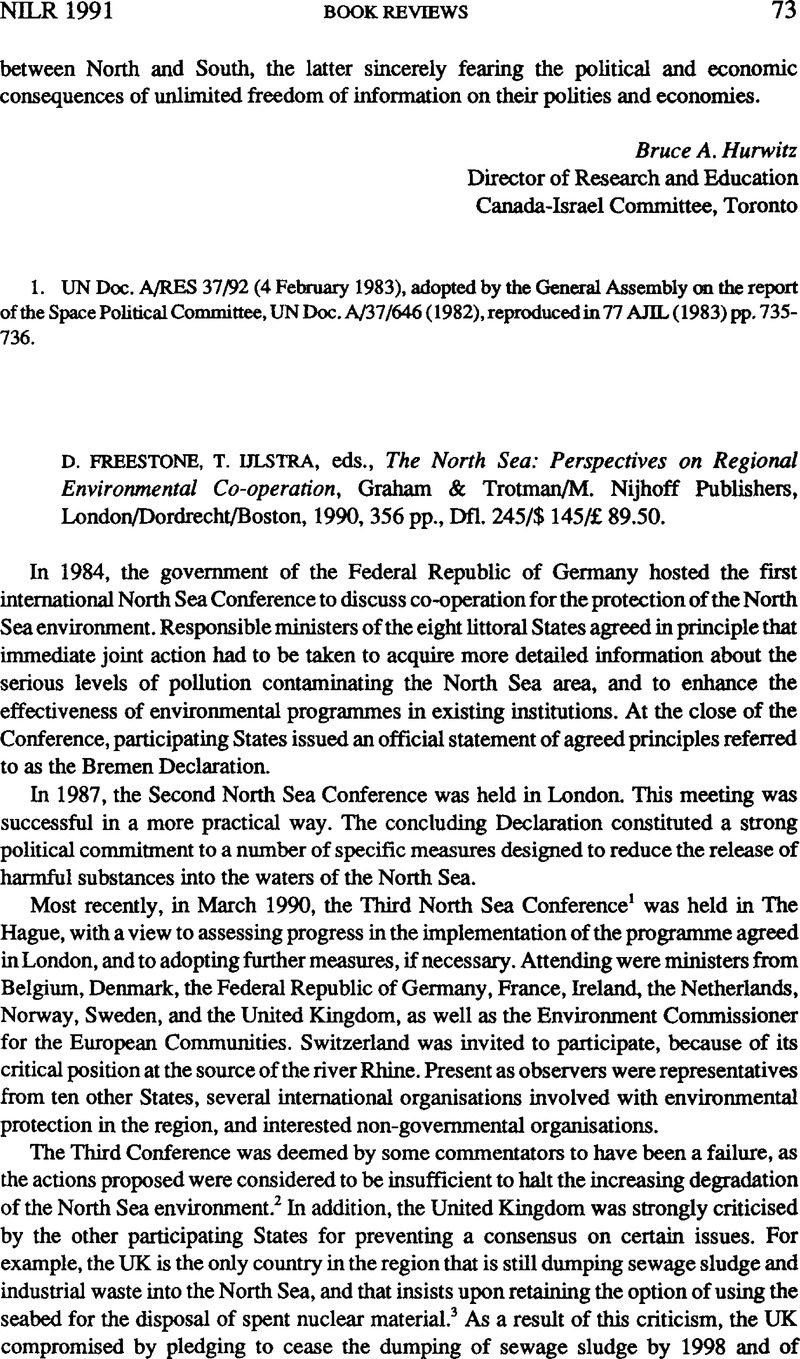No CrossRef data available.
Published online by Cambridge University Press: 21 May 2009

1. For contemporary accounts of the Third Conference, see Financial Times (5–8 March 1990); Ulstra, T., “The Third International North Sea Conference’, 21 Marine Pollution Bulletin pp. 223–226Google Scholar.
2. ‘News’, 21 Marine Pollution Bulletin p. 263Google Scholar; ‘North Sea Insufficient Progress’, 20 Environmental Policy and Law p. 85Google Scholar.
3. At the meeting of the London Dumping Convention (LDC) in November 1990, States parties voted 29–4–2 to include the disposal of nuclear wastes under the seabed in the moratorium on the dumping of such wastes. France, the UK, the USA and the USSR voted against the resolution.
4. Germany, the Netherlands, France, and Switzerland, with Germany being the source of twothirds of most of the dangerous substances. See paper 11 on the Rhine Action Programme. These States have recently concluded an agreement to clean up the Rhine. 21 Marine Pollution Bulletinp. 315.
5. For reasons of efficiency and economy, the Commission administering the Oslo and Paris Commissions operate jointly. They also provide secretariat functions far the Bonn Convention.
6. ICES is concerned with fisheries as well as with pollution. ICES scientists engage in independent research and provide recommendations to various intergovernmental organisations.
7. The Nordic countries wished the phase-out and destruction of PCBs to be effected by 1994, but France and the UK preferred 2005, with other States in favour of 1999. The time limits in the Declaration are therefore a compromise.
8. At the 1990 meeting of the LDC, States adopted a resolution re-affirming the 1988 decision to re-evaluate the incineration at sea of noxious liquid wastes, with a view to termination by 31 December 1994.
9. Although the Netherlands believes that the declaration of an EEZ is necessary to be able to exercise full jurisdiction for the protection of the marine environment, other States do not agree.
10. More recently, in December 1990, theEuropeanCommunityfinallyacceptedtheseriousness of the depletion of the fisheries resources of the North Sea. Some measures to reduce overfishing were adopted, with others under consideration. There is evidence that degradation of the marine environment in the region is also contributing to a high mortality rate.
11. For a recent lively discussion of the precautionary principle by scientists, see 21 Marine Pollution Bulletin pp. 174–176, 402, 598–600.
12. See 20 Environmental Law and Policy no. 3, for reports of meetings and texts of documents. At the Second World Climate Conference held in Geneva from 27 October to 7 November 1990, ministers agreed that, because of the potential devastating consequences, some action should be taken to control climate change despite continuing scientific uncertainties. In October 1990, a ministerial conference on the environment held in Bangkok by the Economic and Social Commission for Asia and the Pacific also endorsed the precautionary principle.
13. See UN Doc. A/45/721, of 19 November 1990.
14. At its meeting in November 1990, the Marine Environment Protection Committee of the IMO approved guidelines for ‘special areas’ under MARPOL, and for particularly sensitive sea areas – PSSA – for the purposes of Art. 211 of the Law of the Sea Convention, the LDC, the UNEP regional seas programme, and national legislation. The PSSA guidelines might be applicable to the Wadden Sea. The MEPC decision still has to be approved by the IMO assembly.
15. See n. 4 supra. The newly united Germany, the European Community and the Czech and Slovak Republic have recently agreed to clean up the heavily polluted river Elbe.
16. Ulstra, T., ‘Air Pollution from Shipping’, 21 Marine Pollution Bulletin pp. 319–320Google Scholar.
17. The 1990 meeting of the LDC adopted a resolution recommending to the UN Conference on Environment and Development that it consider the creation of a new global mechanism to coordinate the protection of the marine environment from all sources, and the creation of a global instrument and new and improved regional agreements to deal with land-based sources of marine pollution. The UNEP Council and the UNCED Preparatory Commission have already designated the protection of the marine environment as a high priority issue.